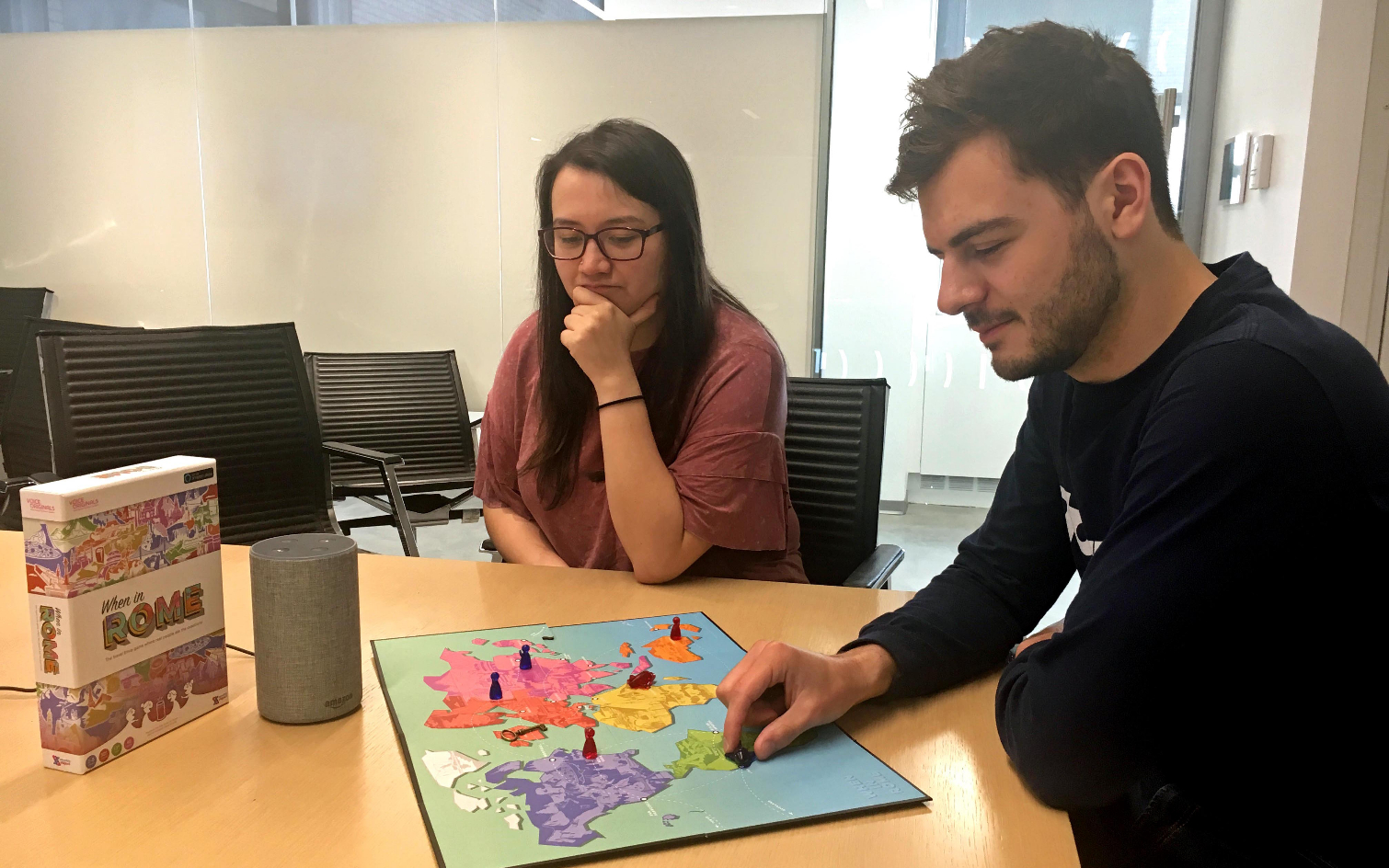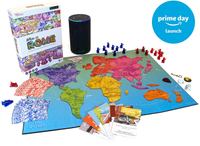The First Alexa Board Game Is Both Fun and Terrifying
The future of board games is bright...but different.
The first board game to incorporate Amazon Alexa is here. Playing it gave me a glimpse of the future of board games — and there's good and bad news.

When in Rome, from London-based developer Voice Originals, is a family-oriented two-player (or two-team) board game in which Alexa tests your knowledge of world geography, language and culture. You set up the game board, which depicts a colorful world map; enable the When in Rome Alexa skill; and say, "Alexa, open When in Rome" — and your Echo device (or any other Alexa-enabled device) will take you the rest of the way.
How to play
That's the first cool thing about an AI-hosted board game: You don't need to learn the rules beforehand. Alexa guides you every step of the way, walking you through placing your pieces, choosing your teams and taking each of your turns. My friends and I are unreasonably opinionated, and a new board game usually entails an awkward learning period in which we fight to read the tiny rule book and attempt to learn (and argue over) the rules. By contrast, this setup was fast, easy and drama-free.

On your turn, you can move your figurine (a cute plastic airplane) to one of 20 major cities labeled on the map, and tell Alexa where you're going. When you land on a city, Alexa will introduce you to a native of that city, who will ask you a trivia question and share some interesting facts. Voice Originals worked with local residents of the featured cities to develop and record the questions.
Some are easy (Which of these is illegal in Moscow?), and some are harder (Which of these is not the name of a pub in London?). Correct answers get you points (which you need to win the game) and other goodies.
I was worried that the Alexa integration in this game would be a gimmick, but there really are elements in the game that couldn't happen without it. For example, one element of winning the game involves collecting "souvenirs" (a thimble, a guitar pick, a key, a ring, a button) that pop up around the board at various times. Alexa tells you when and where a souvenir should appear, and tries to make them appear closer to players with fewer points, in order to even out the playing field.
I was worried that the Alexa integration in this game would be a gimmick, but there really are elements that couldn't happen without it.
By answering certain questions correctly, you can also obtain cards that allow you to acquire some fun perks. One card, for example, allows you to teleport directly to London by saying, "Alexa, I need to see some pigeons right now.” And, of course, the local residents reading the questions add an enjoyable, realistic element to the game that wouldn't be the same on Trivial Pursuit cards.
Socially awkward
On the other hand, a board game hosted by Alexa feels a bit odd. I frequently host board-game nights that consist of a lot of talking, laughing and drinking — a real social affair.

But with Alexa constantly instructing us, When in Rome felt hushed, and almost somber. There was no laugher or side chatter. People communicated in whispers and hand signals, shushing one another if they got too loud. Even though I repeatedly reminded everyone that Alexa would listen only if someone spoke her name, the other players were too afraid to speak over her and miss an important question or instruction, or derail the game by issuing an accidental command.
I hope there will be more Alexa board games. A voice assistant really does tap into new potential ideas, and makes a game easier to play and understand. At the same time, it changes the nature of what it means to play a board game. Alexa takes control — not just of the game, but of your social experience. Alexa is the top dog now, and we are just here to listen.
Most people still haven't really learned to socialize in the presence of Alexa, and When in Rome demonstrated this phenomenon firsthand. Even though Alexa is inanimate, we all felt rude interrupting Amazon's assistant, and were afraid to converse too freely.
As voice-assistant-powered board games become more mainstream, I think they can help us work programs like Alexa into our socializing. Until they do, though, I hope human-only games stick around.
Sign up to get the BEST of Tom's Guide direct to your inbox.
Get instant access to breaking news, the hottest reviews, great deals and helpful tips.
Monica Chin is a writer at The Verge, covering computers. Previously, she was a staff writer for Tom's Guide, where she wrote about everything from artificial intelligence to social media and the internet of things to. She had a particular focus on smart home, reviewing multiple devices. In her downtime, you can usually find her at poetry slams, attempting to exercise, or yelling at people on Twitter.

